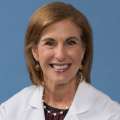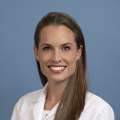After Sara Smith was diagnosed with breast cancer at age 38, her UCLA Health surgeon advised her to undergo genetic testing.
Through an innovative virtual genetic counseling tool, Smith was able to quickly learn about cancer genetic testing, provide consent and get results that shaped her treatment. She found out that she carried two mutations associated with an increased risk of breast cancer. The timely information led her to opt for a bilateral mastectomy.
“I was going to go with just removing one breast, but they told me the chances to get it in the other was higher because of the gene,” Smith said. “I removed the two to avoid getting breast cancer again in the future. I didn’t want to go through all that again.”
Smith and other UCLA Health cancer patients are benefitting from GENETECA™, which stands for Genetics Education and Testing for Cancer. GENETECA™ introduces genetic testing through an informative short video via the MyChart patient portal that explains how genetic testing works, potential results and implications for family members. Patients can then give their consent and undergo testing right away instead of waiting to meet with a genetic counselor first.
UCLA Health sees nearly 17,000 new cancer patients a year, with more than 10,000 of them eligible for genetic testing based on National Comprehensive Cancer Network Guidelines. Yet research shows that most cancer patients skip recommended testing even though the information can help them and their families.
, director of Cancer Population Genetics for the , is working to reduce barriers to testing and broaden access through a point-of-care and more convenient process.
For now, GENETECA™ is only accessible to patients with cancer because they need testing most urgently. However, if they test positive, their family members are also encouraged to seek genetic counseling at UCLA Health. People with a hereditary predisposition who don’t have cancer may qualify for more frequent screenings and/or preventive surgery.
Eliminating the bottleneck
Dr. Karlan said patients with cancer previously needed to schedule an in-person appointment with a genetic counselor before they could get tested. That slowed down the process and added yet another medical visit.
“It created a bottleneck for patients, limiting their access to information that could improve their cancer care, their treatment and their outcomes,” Dr. Karlan said.
Dr. Karlan noted that only 5% to 10% of cancer patients will test positive for a variant or genetic change linked to an increased risk of cancer. In those cases, the information can help them decide on treatment, undergo additional cancer screenings and gain access to certain clinical trials.
By minimizing the need for in-person family history intake meetings, genetic counselors can direct their time and knowledge to helping patients like Smith.
If they choose, patients can still first meet with a genetic counselor, but most prefer to undergo testing as soon as possible and follow up as needed.
Testing shapes treatment
Smith, who lives in North Hollywood, was diagnosed with early-stage breast cancer in 2023. She had found a small lump in her left breast during a self-exam.
Now 39, Smith had a family history of cancer, with her father dying of pancreatic cancer at 56.
“Those were two red flags for me,” she said.
UCLA Health breast surgical oncologist , advised her to undergo genetic testing. Smith recalled sitting in Dr. Thompson’s office and watching a five-minute video that explained the process.
The animated video describes in simple terms how 1 in 10 cancer cases are hereditary, meaning they are caused by a change or mutation in genetic information that is passed down through families. It says that the decision for testing is very personal and can lead to a feeling of empowerment as well as worry.
When DNA is tested, the video explains, the results will come back as positive, negative or uncertain. A variation of unknown significance means the lab found a variation but there isn’t enough information to prove that it increases the risk of cancer.
Smith gave consent after watching and had her blood drawn.
“It was super fast,” Smith said. “I was expecting another appointment and it taking forever.”
Her results came back positive for an ATM gene mutation, which increases the risk of breast and pancreatic cancer, and a BRCA1 mutation that increases the risk of breast and ovarian cancer. She met with a genetic counselor via a telehealth visit to discuss the findings.
Smith also talked to Dr. Thompson, a member of the UCLA Health Jonsson Comprehensive Cancer Center, about what that meant for her treatment. She opted to have both breasts removed and is considering surgery to remove her ovaries.
“Genetic testing gives us the ability to more accurately predict an individual’s risk of developing certain conditions,” Dr. Thompson said. “For Sara, we learned that she carries genes that put her at increased risk of developing more breast cancers in the future, so we used this information to shape her treatment plan in order to give her the best outcome that we could.”
Smith received chemotherapy and is finishing a targeted therapy that blocks growth of cancer cells. Her oncologist also wants her to undergo a scan of her pancreas for additional cancer screening.
As the video explains, if a person tests positive, their parents, siblings and children have a 50% chance of having the same genetic change.
“In the U.S., about 90% of individuals who carry the BRCA gene don’t find out until someone in the family gets cancer,” Dr. Karlan said.
Smith said she shared her results with family members. Among those who decided to get tested, all were negative. She recommends that anyone with cancer or a strong family history get tested so that they can undergo screenings at a younger age or more frequently if they carry the variant.
“The faster or earlier you detect it, the outcome is going to be so much better,” Smith said.
Dr. Thompson said the GENETECA™ process has been beneficial in helping get people tested.
“This streamlined workflow has been valuable in an era where more and more patients are benefitting from being aware of their genetic makeup,” Dr. Thompson said. “It has allowed us to care for our patients in a more efficient manner.”





